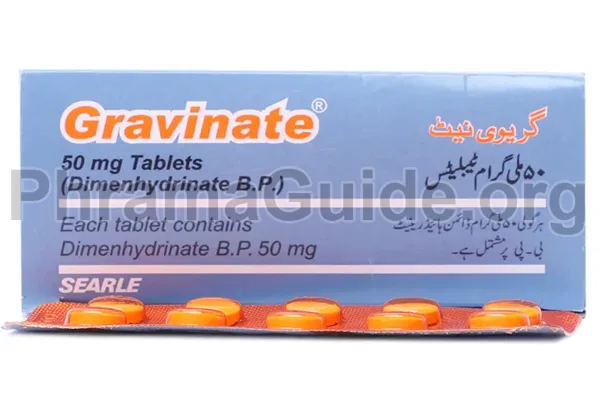Gravinate tablets are used to prevent and treat nausea, vomiting, and dizziness caused by motion sickness. It belongs to the antihistamines class of drugs. Gravinate tablets are commonly used for the following indications:
- Motion Sickness: Gravinate tablet is commonly used to prevent and relieve symptoms of motion sickness, including nausea, vomiting, dizziness, and vertigo. It is often used for travel-related motion sickness, such as during air, sea, or car travel.
- Nausea and Vomiting: Gravinate tablets can also be used to manage nausea and vomiting caused by other conditions, such as inner ear disorders (e.g., Ménière’s disease), viral infections, or postoperative recovery. It has antiemetic properties that can help alleviate these symptoms.
- Vertigo: Vertigo is a type of dizziness characterized by a spinning or whirling sensation. Gravinate tablets may be used to relieve vertigo associated with various conditions, including inner ear disorders like labyrinthitis or benign paroxysmal positional vertigo (BPPV).
Off-Label Uses of Gravinate Tablet
- Vestibular Disorders: Gravinate tablets may be used off-label to manage symptoms related to vestibular disorders, such as labyrinthitis, vestibular neuritis, or Ménière’s disease. It helps reduce dizziness and alleviate associated symptoms.
- Insomnia: Due to its sedating effects, Gravinate tablet has been used as a short-term sleep aid in some cases. It may help induce sleep and alleviate difficulty falling asleep or staying asleep.
- Anxiety: Gravinate tablet’s sedative properties may be utilized to help manage anxiety symptoms. It provides a calming effect and alleviates anxiety-related symptoms, although it is not a first-line treatment for anxiety disorders.

What is Gravinate?
Gravinate is one of the leading brands of Dimenhydrinate, manufactured and marketed by Searle Pharmaceuticals Pakistan.
Gravinate Alternatives : Other Dimenhydrinate Brands
The following are some alternative brands of Gravinate and their manufacturers.
- Dymin : Stanley Pharmaceuticals (Pvt) Ltd, Pakistan.
- Dramamine : Pfizer Laboratories Inc.
- Dramine : Safe Pharmaceutical (Pvt) Ltd, Pakistan.
- Devom : Siza International (Pvt) Ltd, Pakistan.
- Dimentin : Munawar Pharma (Pvt) Ltd, Pakistan.
- Emetox : Star Laboratories (Pvt) Ltd, Pakistan.
- Cayminate : Caylex Pharmaceuticals (Pvt) Ltd, Pakistan.
- Hydrate : Miracle Pharmaceuticals (Pvt) Ltd, Pakistan.
- Ephadryl : Epharm Laboratories, Pakistan.
Gravinate : Available Formulations and Strengths
Presently, Gravinate is available in Tablet, Injection, and Syrup Forms
Gravinate Tablet : 50mg Strength.
Gravinate Injection : 50mg Strength.
Gravinate Syrup : 12.5mg/4ml.
Who Should Not Use Gravinate?
Gravinate has several contraindications, which are specific situations or conditions in which the use of Gravinate is not recommended. These contraindications include:
Hypersensitivity: Gravinate is contraindicated in individuals who have a known hypersensitivity or allergy to Gravinate or any other components of the medication. Allergic reactions can range from mild skin reactions to severe systemic reactions and require immediate medical attention.
Acute Asthma or Lower Respiratory Tract Symptoms: Gravinate is contraindicated in individuals with acute asthma or lower respiratory tract symptoms, such as acute exacerbations of chronic obstructive pulmonary disease (COPD). It may cause thickening of bronchial secretions, which can worsen respiratory conditions.
Glaucoma: Gravinate is contraindicated in individuals with narrow-angle glaucoma, a type of glaucoma characterized by increased intraocular pressure. Antihistamines like Gravinate can exacerbate this condition by causing pupillary dilation and increasing intraocular pressure.
Prostatic Hypertrophy: Gravinate should be used with caution in individuals with prostatic hypertrophy, a condition characterized by an enlarged prostate gland. It can cause urinary retention and worsen the symptoms associated with this condition.
Stenosing Peptic Ulcer: Gravinate is contraindicated in individuals with stenosing peptic ulcer, a condition characterized by a narrowing of the gastrointestinal tract due to ulcers. It may delay gastric emptying and exacerbate symptoms related to this condition.
Central Nervous System Depression: Gravinate is contraindicated in individuals with central nervous system depression, such as severe sedation, coma, or alcohol intoxication. It can potentiate the sedative effects and further depress the central nervous system.
What is the Recommended Daily Dosage of Gravinate?
When using Gravinate for motion sickness or nausea and vomiting it is important to understand the proper dosage and uses of this medication.
Maximum Dose Daily Dose is 400mg (Oral/IM/IV) within 24 hours.
Gravinate Tablet for Adults: 50 to 100mg (1 – 2 Tablets) and repeat with 4 to 6 hours intervals as needed, 30 minutes before exposure to motion.
Gravinate Tablet for Children (ages, 6–12 years old): The recommended dose range is 25–50mg every four hours with a maximum daily dose of 200 mg per day.
Gravinate Syrup for Children (Ages 2-5 years old): The dose is 1 to 2 ml (1-2 Teaspoons) and repeat with 4 to 6 hours intervals as needed, 30 minutes before exposure to motion. The dose should not exceed 75mg (6 Teaspoons) per day when using this medication.
Gravinate Injection (IM, IV): 1 to 2 Injection (50 to 100mg) Intramuscular or Intravenous If needed the dose may repeat after every 4 hours.
How Gravinate Works?
Gravinate works by blocking the activity of histamine at H1 receptors in the brainstem area responsible for regulating nausea, vomiting, and balance control systems.
Related Links:

Leave A Comment